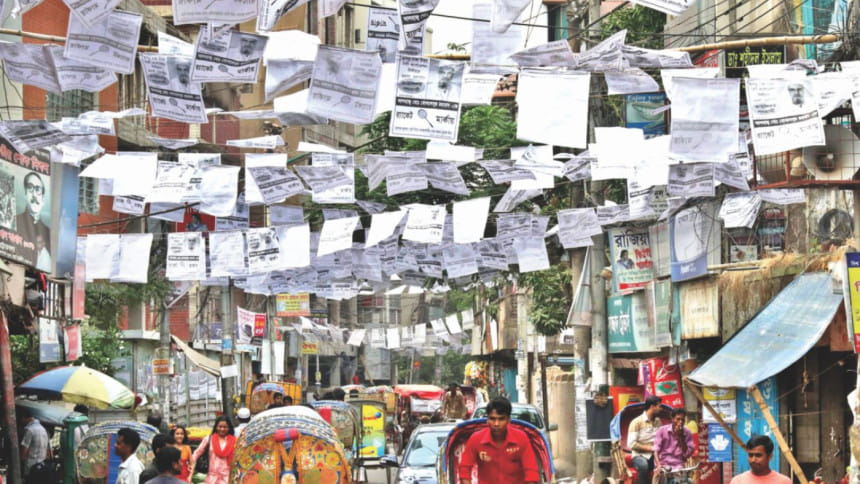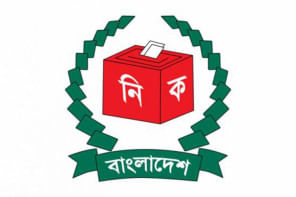Pledges just hollow

Many of the pledges the mayoral aspirants are making in their manifestos for the April 28 city corporation elections are outside the legal and financial mandates of a mayor, say leading local government and urban experts.
Such promises mostly concern mass transport system, power plant, commuter train service, circular waterways, river and canal reclamation, land use control, housing, flood plains conservation, water-logging and uninterrupted services of water, electricity and gas.
"It seems they have made such pledges without having understood their mandate and authority," said noted urban researcher Prof Nazrul Islam.
Among its other jobs, city corporations collect revenue and take care of vital civic amenities like waste collection and management, mosquito control, maintenance and repair of roads and footpaths, surface drains, street lightings and fighting food adulteration. The list is long but it does not include any of the issues the candidates are promising to take care.
Both Annisul Huq and Sayeed Khokon -- Awami League's mayor candidates in Dhaka north and Dhaka south -- have pledged a faster completion of the metro rail, the elevated expressway, the circular waterway and the shuttle train service projects to fix traffic jams in the city.
Khokon's list of promises also includes ensuring pollution and encroachment free Buriganga River, safe drinking water, a dedicated power plant for the city and uninterrupted supplies of gas and electricity.
All these promised areas fall under different implementing authorities. Power plants are the responsibility of the power and energy ministry, while the Dhaka district administration and the Bangladesh Inland Water Transport Authority (BIWTA) take care of the rivers. The BIWTA is also responsible for circular waterways.
Sayeed Khokon has also promised to control land use for housing and ensure construction of earthquake-resistant high-rise buildings, though the Rajdhani Unnayan Kartripakkha (Rajuk) looks after these under the Town Improvement Act, the Detailed Area Plan (DAP) and the Bangladesh National Building Code.
Asked why he made such promises then, he said his political clout would work for him.
"I will try to get those done using my political influence," said Khokon, son of former Dhaka mayor Mohammad Hanif.
Annisul Huq also thinks that his political connections will help him. He said he would try to coordinate with other organisations with prime minister's backing.
Tabith Awal, the BNP-backed mayor aspirant for Dhaka north, has pledged a Tongi-Kamalapur commuter train to help solve the traffic mess of the city.
A train service, however, is subject to the plan, decision and resource of the communications ministry.
Experts say there is hardly any precedent of a political government delegating its power to a local government entity like the city corporation.
Some other pledges Tabith has made include rearrangement of city bus routes, introduction of mass transport service exclusively for women, increase double-decker and modern buses in the city, and making circular waterway functional around the capital.
However, road transport is under the communications ministry, the Bangladesh Road Transport Authority and the Bangladesh Road Transport Corporation. The much-hyped circular waterway has been meaningless for many years due to a dozen low-height bridges built by various government authorities.
Mayors do not have any authority over these fields and they will not be able to deliver anything beyond their mandate, said Tofail Ahmed, a renowned local government expert.
One fundamental weakness of such pledges is that political parties do not own those as their agenda, though the mayoral candidates enjoy some political support during elections, he said.
"Then how can these commitments be translated into actions?" he asked.
Water, electricity and gas supplies are some basic civic services, but other government agencies are mandated to do the job, not the city corporations, said Ahmed.
The city mayors, however, can do advocacy with the government to expedite those, he added.
The CPB-backed contender for the North Abdullah Al Kafi has pledged relocation of factories and industries away from the city and recovery of city canals filled up by grabbers and turned into roads and box culverts by the city corporation itself.
While relocation of factories is a political decision requiring inter-ministerial action, canal reclamation is the job of the district administration and the Wasa, said experts.
Election pledges made by Bahauddin Babul, mayor hopeful for the North and Saifuddin Ahmed Milon, a contender for the South, include making Dhaka city free of traffic congestion, ensuring uninterrupted utility services like supplies of gas, electricity and water and eviction of the Turag and the Buriganga grabbers.
The reality is city corporations have nothing to do with these services. Titas Gas company, DPDC, Desco and Wasa look after these utility services.
Junaid Abdur Rahman Saki, another aspirant for the North, has pledged that he would take measures to reclaim flood plains, wetlands and Dhaka rivers illegally occupied by powerful grabbers, though that is not the job of a city corporation. Rajuk is mandated to do this.
Most of the aspirants have pledged to resolve the city's water-logging problem. But it is a mandate of Dhaka Wasa. It now stands as a Herculean task with most of the conservable wetlands, water retention ponds and water bodies around the city filled up by developers of illegal private housing schemes, said urban experts.
But such election pledges are nothing new, said Prof Zarina Rahman Khan, a local government researcher, who teaches public administration at Dhaka University.
"The mayor candidates thought that talking about these issues would make them popular," she added.

 For all latest news, follow The Daily Star's Google News channel.
For all latest news, follow The Daily Star's Google News channel. 



Comments